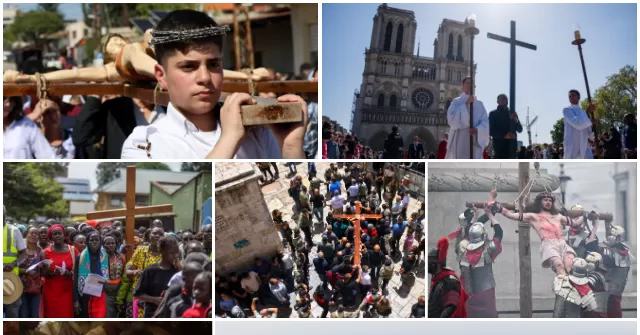Good Friday is a significant day for Christians around the world as it marks the anniversary of the crucifixion of Jesus Christ. This solemn day is observed with great reverence and devotion by believers, who reflect on the ultimate sacrifice made by Jesus for the salvation of humanity.
According to the Bible, Jesus was betrayed by one of his disciples, Judas Iscariot, and handed over to the Roman authorities. He was then subjected to a series of trials and ultimately sentenced to death by crucifixion. This brutal form of execution involved nailing a person to a wooden cross and leaving them to die a slow and agonizing death.
On Good Friday, Christians remember the suffering and death of Jesus on the cross. It is a day of mourning and reflection, as well as a reminder of the immense love and grace of God. Despite the pain and humiliation, Jesus willingly endured the cross for the sake of humanity, fulfilling the prophecy of his death and resurrection.
The events of Good Friday took place in Jerusalem, the holy city where Jesus spent the last days of his life. Today, Christians from all over the world gather in Jerusalem to retrace the steps of Jesus and visit the sites associated with his crucifixion. The most significant of these is the Church of the Holy Sepulchre, built on the site where Jesus was crucified, buried, and resurrected.
However, due to the ongoing pandemic, many Christians are unable to make the pilgrimage to Jerusalem this year. Instead, they are observing Good Friday in their homes and local churches, united in spirit and prayer. Despite the physical distance, the significance of this day remains unchanged, and Christians are finding creative ways to commemorate it.
In many countries, Good Friday is a public holiday, and churches hold special services to mark the occasion. The atmosphere is somber, with the altar draped in black and the cross veiled in mourning. The readings and hymns focus on the suffering and death of Jesus, and the congregation is encouraged to reflect on their own lives and the sacrifices they can make for others.
One of the most poignant traditions of Good Friday is the Stations of the Cross, where believers walk the path that Jesus took on his way to Calvary. Each station represents a significant event in the final hours of Jesus’ life, and prayers and meditations are offered at each stop. This practice allows Christians to connect with the suffering of Jesus and understand the depth of his love for humanity.
Another essential aspect of Good Friday is fasting and abstinence. Many Christians choose to abstain from meat and other luxuries as a sign of sacrifice and solidarity with Jesus. This practice also serves as a reminder of the suffering of those less fortunate and encourages believers to share their blessings with others.
Despite the somber nature of Good Friday, there is also a sense of hope and anticipation. Christians believe that Jesus’ death on the cross was not the end, but the beginning of a new life. On Easter Sunday, they celebrate his resurrection and victory over death, which is the cornerstone of the Christian faith.
In conclusion, Good Friday is a significant day for Christians around the world, as it commemorates the ultimate sacrifice made by Jesus for the salvation of humanity. It is a day of mourning, reflection, and fasting, but also a reminder of the immense love and grace of God. As we observe Good Friday this year, let us remember the message of hope and redemption that it brings and strive to live our lives in accordance with the teachings of Jesus.






![Complete BritRail Pass Guide [Types, How to Use It, Pros + Cons]](https://inside-news.uk/wp-content/uploads/2025/06/00221EB4-BCA2-4DBB-6CD4-83DBC37D71FA-120x86.webp)















